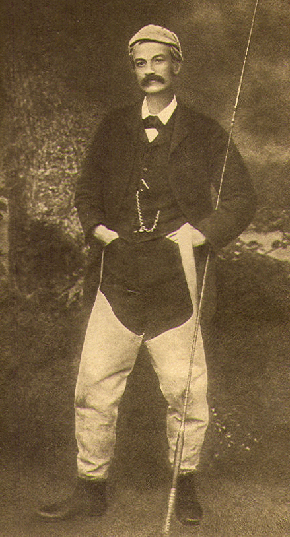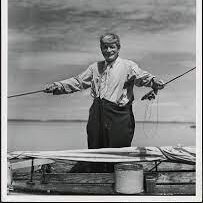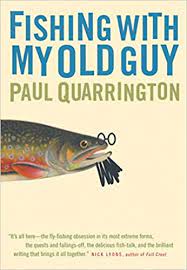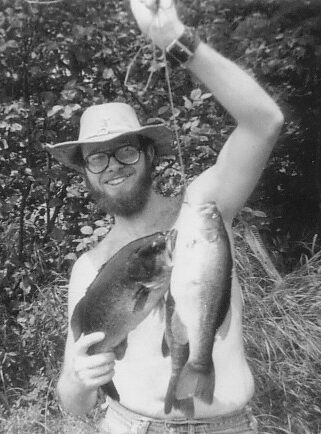
Duffer. The most dreaded word in the fly fishing lexicon, conjuring images of incompetence and clumsiness, even folly. There exists in the contemplative recreation a fine 7X leader between success and failure. So it isn’t surprising that the notion is a small tributary in the great river of fly angling literature. It’s a recurring subject, character, theme and motif in the narrative vest or tackle box of angling writers who cast a humorous line on the water.

I first encountered the concept in Andrew Lang’s essay ‘The Confessions of a Duffer,’ collected in Angling Sketches, originally published in 1891. While some men ‘are born duffers,’ the great Scottish scholar, man of letters and angler opines, others ‘become so by an infinite capacity for not taking pains. Others, again, among whom I would rank myself, combine both these elements of incompetence.’
Lang elaborates: ‘Nature, that made me enthusiastically fond of fishing, gave me thumbs for fingers, short-sighted eyes, indolence, carelessness and a temper which (usually sweet and angelic) is goaded to madness by the laws of matter and of gravitation.’ I sympathize with Lang’s response to the question of why, if an angler is so inept, he even bothers to fish? ‘Perhaps it is an inherited instinct, without inherited power . . . [a] passion without the art.’ Lang concludes: ‘My ambition is as great as my skill is feeble.’
Later, I happened across the idea in Hugh Tempest Sheringham’s essay ‘The Duffer’s Fortnight,’ collected in Trout Fishing: Memories and Morals, published in 1915. The celebrated English angling journalist noted the fortnight coincided with the traditional ‘mayfly carnival’ that heralded the birth of trout season around the first of June. This was when ‘the duffer could show himself an angler.’ With its origin ‘lost in the mist of antiquity,’ he goes on to suggest the term eventually flipped topsy-turvy to include ‘the angler who proves himself the duffer.’ Quite ingeniously Sheringham’s satirical line alights on the whole damn pool of fly anglers irrespective of talent, skill and experience.
Sheringham took up the cause of the Duffer again in 1915 when Fishing: Its Cause, Treatment and Cure was first published. The collection of essays might well be subtitled The Duffer’s Bible, so thoroughly does it delineate in painstaking detail the ignominious trials of the ‘angler.’ It’s difficult to select a quote to give readers the book’s flavour, so abundant is its pathetic riches. However, here is a lengthy passage that must be offered in full to convey a full appreciation of Sheringham’s self-appointed. Taking umbrage with the old saw that ‘The first cast is the one that catches the fish,’ he opines:
This maxim for the dry-fly man is very misleading. The first cast generally does not reach the river at all, being intercepted by a thistle. The second cast is blown askew, the third falls awry, the fourth goes agley, the fifth is intercepted by another thistle (or the same one), the sixth wraps round the top of the rod, the seventh results in a crack in mid-air, the eighth is spent in putting on a new fly, and the ninth is spoilt by another thistle (new flies dearly love thistles, much as children in their Sunday best love mud and thorns). After this, however, things begin to improve. The axiom should run: ‘The tenth or eleventh cast is the one that puts the fish down.’
Like so much of the lore, lures and allure of fly fishing, the concept waded the Atlantic. I found evidence of it in Maine’s beloved piscatorial tale-spinner Walter Macdougall through his stories featuring the irrepressible fishing guide Dud Dean.
I also met the Duffer, in one form or another, in some of Canada’s worthiest fly fishing humourists including Stephen Leacock, Greg Clark, Mordecai Richler and Paul Quarrington.
Often celebrated as Canada’s Mark Twain (with a softer edge), Leacock maintained a trout pond (at considerable cost according to Robertson Davies) at his beloved summer home on Old Brewery Bay, outside of Orillia, Ontario. A lifelong fishing addict, he was a devoted fly angler who tied his own flies. Margaret MacMillan reports in her biography of the writer, published in the Extraordinary Canadians series by Penguin Canada, that Leacock was passionate about fishing ‘as much for the rituals with which he surrounded it as for the fish themselves.’ As a budding angling memoirist, I subscribe wholeheartedly to Leacock’s approach to the contemplative recreation.

Over his long writing career, including publication of the classic Sunshine Sketches of a Little Town, Leacock filled a ditty bag of stories on angling manners, morals and mores—almost all of which involved soul-quenching quantities of distilled spirits: ‘The Old, Old Story of How Five Men Went Fishing,’ collected in Frenzied Fiction and originally published in 1919; ‘Why do we fish?’ and ‘When Fellas Go Fishing,’ collected in My Remarkable Uncle and originally published in 1942; ‘What Can Izaak Walton Teach Us?’ collected in the posthumous Last Leaves; and ‘My Fish Pond,’ originally published in the Atlantic Monthly in 1936 and released in 2020 in a limited edition, privately printed pro bono publico by Eildon Chapbooks.
In addition to being one of Canada’s most accomplished novelists and contentious journalists, Richler was an enthusiastic fan of numerous sports including hockey, baseball, boxing and billiards. In later years he took up fly fishing in response to ‘the feeling of having arrived’, son Noah speculates, in addition to reflecting ‘his love of the Canadian outdoors’ which he conveys in a couple of his novels, Barney’s Version and Solomon Gursky Was Here. Although Richler was generally viewed as a staunchly urban writer, whether his setting was Montreal or London, he took the advice of one of his most famous fictional characters (Duddy Kravitz) and purchased rural property overlooking a Laurentian lake.

Richler reluctantly plays the role of Duffer Abroad expressed through his trademark sardonic humour in ‘An Incomplete Angler’s Journal’ contained in Dispatches from the Sporting Life, a posthumous collection of sports essays and excerpt from St. Urbain’s Horseman published in 2002. The essay recounts a trip the author made with his wife in September, 1988 in pursuit of salmon in Shetland, Orkney and the Scottish Highlands. With one exception, he doesn’t have anything good to say about either the cuisine or the weather, let alone the fishing. However, he lauds the single malt, especially eighteen-year-old Macallan, which, in agreement Kingsley Amis, a noted tippler, he praised as ‘about the most delicious malt ever.’
The Duffer casts his rod and reel in Clark’s comic yarns devoted to fishing in all its guises, collected in Fishing with Gregory Clark and Greg Clark & Jimmie Frise Go Fishing, not to mention other volumes. Clark would stop at nothing in his pursuit of finned creatures—the bigger the better. His confession in ‘The Frying Pan,’ a yarn at the expense of an esteemed Quebecois fishing guide, reveals the inner duffer hidden within the breast of every fishermen. ‘Now, I am not a great fly fisher, nor even a particularly good one,’ he confides. ‘But I am a tremendously lucky one. It may be I have loved fly fishing so ardently and so long, it likes me in return. Such things may be.’ I think Clark—who is credited with naming the famous Mickey Finn streamer fly—is onto something.

Quarrington, who was a better fly angler than he ever deigned to admit in print, carried the Duffer torch with pomp, pride and defiance in Fishing With My Old Guy and From the Far Side of the River: Chest-Deep in Little Fish and Big Lies. Ditto for his Duffer-in-arms, Jake MacDonald, author of Houseboat Chronicles: Notes from a Life in Shield Country and With the Boys: Field Notes on Being a Guy, and editor of Casting on Quiet Waters: Reflections on Life and Fishing.
Perspicacious readers will sense where I’m going with this line of piscine inquiry. I too have worn the leaky waders of a duffer. It’s not something of which I’m proud, but rather I acknowledge it in the name of truth and honesty as an intrepid fly fisherman obliged to write about his misfortune. After all, disgrace and shame are but a cast away. They are the bane of fly anglers, constant nemeses that stalk rivers, lakes and streams. Worse than mosquitoes, black flies and those pesky miniature flying pests known colloquially as no-see-ums.
Readers do not have to be obsessive anglers to take unbridled delight in the antics of a duffer. To find yourself playing such a role is another matter, however. For starters it’s not even mildly funny. It exceeds frustration; the word ‘humbling’ comes to mind.
Through the contemplative recreation I have learned it is better to anticipate than to expect. Expectation is a dangerous condition for fly anglers. Failing to achieve it leads to a sense of failure, resulting in despair. Anticipation is a fish of another creel. When unfulfilled, it is merely disappointing, like forgetting to fill your flask with malt whisky before leaving for the river. Still, separating expectation from anticipation offers little consolation to an angler wearing the scarlet letter of duffer.
Comedic tale-spinning aside, most fly anglers are not duffers all of the time; however, there are precious few who are not duffers some of the time. I fall somewhere in the latter category—at least as I see it. For example, I have caught my fair share of trout (rainbow, brown and brook) on a certain headwater in southwestern Ontario which I cherish beyond all other waters. Although none have exceeded twelve inches, they have given me existential satisfaction and an abiding sense of deep contentment.
Still, there is a piece of this generous headwater that has defeated me, casting me repeatedly in the role of duffer. And it is to this piece of piscatorial paradise that the following woeful angling tale unfolds.
It occurred over two seasons during the annual Hexagenia Hatch at the height August. A year after my introduction to this awe-inspiring mayfly ritual of procreation before death, Ken Robins invited me back to his stretch of hallowed river. I was both thrilled and anxious, more than a little trepidatious. I tried in vain to scratch any itch of expectation.
Things did not begin well, which should have been a forewarning. Having visited Ken’s riverine property twice the previous summer, I was confident I knew where I was going. I was wrong. Upon arriving where I thought the gate to Ken’s place should be, it was not to be found. Moreover, stranded on a gravel concession road, I could go no farther because the bridge traversing the headwater was closed, complete with a posted sign warning vehicles and pedestrians not to cross. Evidently I had made a wrong turn (or two) somewhere along the way–an angling pilgrim without a compass, as it were.
I was an hour late already, and was at a loss, when, as if by magic, my cell phone came to life. It was Ken’s partner Lilianna asking where I had gotten myself. I explained my location and she passed the phone to Ken. Following his directions, I was on my merry way.
Arriving late did not prevent me from eagerly fishing new water for ninety minutes before supper. My effort was rewarded with three chub, totaling twelves inches. Not the start I wanted, but no matter. I was here for monster trout that would be gorging on large delectable Hexagenia mayflies on the edge of darkness.
During supper Ken and Lilianna regaled me with details involving a huge trout so stream-smart they christened him Einstein. This quick-witted leviathan would be my quarry. Like a boxer in training, I began exercising my mental angling muscles, such as they are. From what my hosts had said, I knew this wily bastard would employ every artful trick in a trout’s tactical tool box to evade my fly. After failing to land a monster on my two visits the previous summer, I was determined to enact Rob’s Revenge.

Before the Appearance of the Duffer
After supper Ken took me to the riffle where I could expect to find the brainy predatory beast. He told me to sit on a specific boulder and keep a sharp eye out and wait . . . and wait . . . and wait . . . and wait. I did as he had instructed—or so I thought. I chewed gum to pass the time as the curtain of darkness fell on the enchanting riverscape.
Einstein, however, was nowhere to be found, failing to rise on this evening of great expectation. Not to be deterred I stood and moved gingerly to a position from where I could cast to ‘smaller’ trout—which might well have been as big as, or bigger than, any trout I had ever caught.
I cast to multiple rises with a juicy Hex pattern tied by Ken to match the specifics of this particular hatch, on this particular stretch of river, at this particular time of year. I was sure Ken’s fly would be the ticket, transporting me to piscatorial glory. It was not to be. Although glory exceeded my grasp, I refused to retreat to defeat and despair.
Instead I switched to a fetching Hex dry fly tied by Steve May—a contract tier for the venerable Orvis Company and a former fishing guide who really knows his stuff. I reasoned that the resident trout had grown accustomed to Ken’s fly. I would outfox (or rather out-trout) them with an irresistible killer fly they had never seen before. Such are a duffer’s well laid plans. Turns out deceit and deception were cards I did not hold in my hand.
I didn’t get a nibble, let alone a strike or a take, after thirty minutes of futility. As every fly angler knows, nothing pricks the heart like rejection.
When it grew too dark to see, and after putting down every fish within casting distance, and beyond, I returned to our rendezvous site at Ken’s picnic table and joined Lilianna. Like me, she came to fly fishing late in life. What she surrendered in years, however, has been more than made up for in delight, which is infectious. To listen to her talk about fishing is to hear the voice of a young girl enthralled with the bounty and wonder of nature. Rapturous is not too strong an adjective to describe her joy.
Turns out Lilianna had gotten her fly line hopelessly entangled (a situation I know well), forcing her to leave the river prematurely—but not before winning the right to do so. While fishing a few hundred feet downriver from me, she landed a gorgeous nine-inch brook trout and a magnificent nineteen-inch brown trout. She snapped photos on her cellphone before releasing the beautiful creatures to the depths from whence they came. Just looking at her phone caused my eyes to well up, reminding me that a fly angler’s tears are as bittersweet as a baby’s.
Ken didn’t do as well as Lilianna; however, he did better than me a little way upriver from where I had intended to debate Einstein. It was the same old tale grown weary—at least from my vantage point. To paraphrase Samuel Taylor Coleridge’s hapless Ancient Mariner: Trout, trout everywhere, nor any bite to take.
Ken sympathized, pointing out that I had left the boulder ten minutes too soon. Had I waited, he surmised, Einstein would likely have made an appearance, rising brilliantly to the occasion. Even worse, Ken was beginning to feel bad for not putting me onto a memorable trout. Seems like the Fishing Goddess, that fickle mistress with a sick sense of humour, was playing me for a duffer. I was chum in her hands.
A couple of days later I received an email from Ken. I record it here in its entirety. It speaks for itself.
Hi Rob:
We went up to the headwater yesterday, added gravel to the spawning bed, pruned some tree branches and then fished. I went to the riffle and sat on the rock [the same one I sat on]. The Hex came on at eight and a couple of smaller trout started rising fifteen minutes later but I stayed on the rock. Then, at eight-thirty [about the time I had left the rock], an explosive rise happened in the middle of the river, just upstream of me and opposite the lower log jam. After two more big rises, I waded across and started casting.
As before, Einstein unconventionally moved around rising, making it difficult to target him. He rose in an area about four feet across and eight feet up and downstream. After a number of casts to various rises, he stopped, probably because my line landed over him as he moved around. I backed down about ten feet and waited. After a couple of minutes he started rising again. He took my second cast. I finally landed him, an eighteen-and-three-quarter-inch male in full colour. He did not reach the magical twenty-inch mark, so he is still swimming around in the riffle.
I am sorry you did not get to catch him, but he was not the twenty-plus inch brown we thought, so you couldn’t have achieved that milestone.
Always the angling gentleman, Ken tried his best to paint a happy face of encouragement over my mask of duffer. He concluded by noting:
Also, Lilianna caught the nine-inch brook trout again at the same location. She said there were many larger trout rising that rejected her fly. She even saw one of them come up and examine her fly before backing down. Such is fly fishing when trout have been feeding on the same fly for weeks.
Ken
All a duffer can do is read and weep. And, ever the optimist, wait on next season. And be comforted by Andrew Lang’s soothing words: ‘I would as soon lay down a love of books as a love of fishing . . . . For fishing is like life; and in the art of living, too, there are duffers, though they seldom give us their confessions. Yet even they are kept alive, like the incompetent angler, by this undying hope: they will be more careful, more skillful, more lucky next time.’
In his email Ken captured the spirit of Lang’s sentiment in three magical words: Maybe next year.